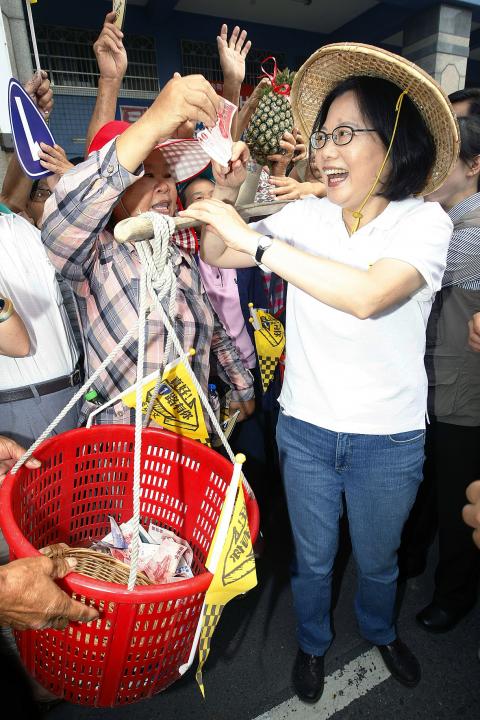A crowd of about 10,000 supporters rallied in Greater Kaohsiung yesterday evening as the Democratic Progressive Party (DPP) presidential ticket of DPP Chairperson Tsai Ing-wen (蔡英文) and her running-mate Su Jia-chyuan (蘇嘉全) stepped up their campaign to win January’s election.
The rally, held on the third day of Tsai’s 11-day campaign tour of the west coast, was the first of three planned large rallies in campaign, which aims to consolidate voter support with less than 100 days to go before the Jan. 14 election.
“Many people have described the campaign atmosphere as ‘cool,’ but I don’t feel it. The campaign atmosphere in southern Taiwan has seemed very hot to me,” Tsai said.

Photo: CNA
The traveling group has received warm receptions in southern Taiwan, which has long been viewed as the DPP’s stronghold, especially in Tsai’s hometown of Pingtung County. However, the DPP would not take the event lightly.
“We would love to have a good start, given that tonight’s event is the first of three [rallies] during the trip,” a DPP official who wished to be anonymous said, adding that a controversy surrounding Su’s farmhouse “has also been a distraction for the campaign lately.”
Several DPP officials said that the party was hoping to garner at least 60 percent of the votes in southern Taiwan and to equal Chinese Nationalist Party (KMT) President Ma Ying-jeou’s (馬英九) support in central Taiwan.
The DPP has vowed to return to power after going through a period of decline, Kaohsiung Mayor Chen Chu (陳菊) told supporters who packed the Workers’ Park.
“But that would not be possible without your consolidated effort and support,” Chen said, urging voters to support Tsai and make Tsai the first female president in Taiwan’s history.
In addition to Chen, DPP heavyweights, including former premiers Frank Hsieh (謝長廷), Su Tseng-chang (蘇貞昌) and Yu Shyi-kun (游錫堃), also showed up at the event
Earlier in the day, Tsai during a campaign stop warned the Ma government about monopolies on coffee beans, milk powder and natural gas, among others, amid widespread complaints about price hikes on coffee.
Global and domestic influences both factor in the coffee hike increase, Tsai said during a presidential campaign stop yesterday, and the government should pay attention to the latter.
In Taiwan, coffee, milk powder and natural gas have long been monopolized by a few companies, she said, adding that prices of agricultural products and average salaries were dropping at the same time.
“The government has viewed these problems as election issues, rather than people’s daily needs,” she said.
The campaign trip, which will take Tsai and Su through 79 townships and 14 counties, will arrive Greater Tainan today. It will conclude in Taipei next Sunday.

CHANGING LANDSCAPE: Many of the part-time programs for educators were no longer needed, as many teachers obtain a graduate degree before joining the workforce, experts said Taiwanese universities this year canceled 86 programs, Ministry of Education data showed, with educators attributing the closures to the nation’s low birthrate as well as shifting trends. Fifty-three of the shuttered programs were part-time postgraduate degree programs, about 62 percent of the total, the most in the past five years, the data showed. National Taiwan Normal University (NTNU) discontinued the most part-time master’s programs, at 16: chemistry, life science, earth science, physics, fine arts, music, special education, health promotion and health education, educational psychology and counseling, education, design, Chinese as a second language, library and information sciences, mechatronics engineering, history, physical education

The Chinese military has boosted its capability to fight at a high tempo using the element of surprise and new technology, the Ministry of National Defense said in the Quadrennial Defense Review (QDR) published on Monday last week. The ministry highlighted Chinese People’s Liberation Army (PLA) developments showing significant changes in Beijing’s strategy for war on Taiwan. The PLA has made significant headway in building capabilities for all-weather, multi-domain intelligence, surveillance, operational control and a joint air-sea blockade against Taiwan’s lines of communication, it said. The PLA has also improved its capabilities in direct amphibious assault operations aimed at seizing strategically important beaches,

New Taipei City prosecutors have indicted a cram school teacher in Sinjhuang District (新莊) for allegedly soliciting sexual acts from female students under the age of 18 three times in exchange for cash payments. The man, surnamed Su (蘇), committed two offenses in 2023 and one last year, the New Taipei District Prosecutors’ Office said. The office in recent days indicted Su for contraventions of the Child and Youth Sexual Exploitation Prevention Act (兒童及少年性剝削防制條例), which prohibits "engaging in sexual intercourse or lewd acts with a minor over the age of 16, but under the age of 18 in exchange for

The High Prosecutors’ Office yesterday withdrew an appeal against the acquittal of a former bank manager 22 years after his death, marking Taiwan’s first instance of prosecutors rendering posthumous justice to a wrongfully convicted defendant. Chu Ching-en (諸慶恩) — formerly a manager at the Taipei branch of BNP Paribas — was in 1999 accused by Weng Mao-chung (翁茂鍾), then-president of Chia Her Industrial Co, of forging a request for a fixed deposit of US$10 million by I-Hwa Industrial Co, a subsidiary of Chia Her, which was used as collateral. Chu was ruled not guilty in the first trial, but was found guilty